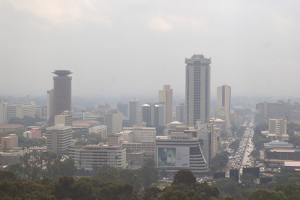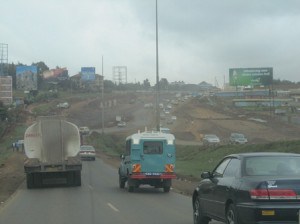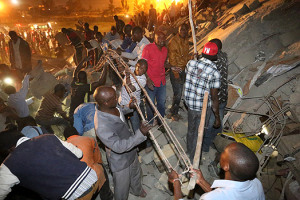
Often a thick cloud of smog hands over Nairobi: Source http://aphrc.org/vehicles-air-pollution-and-health/
Nairobi, like many of the world’s cities, is facing a growing problem of air pollution which can have very serious health impacts. Recently, NPI had a chance to talk to one of the city’s public health and air quality experts Kanyiva Muindi. Kanyiva is a researcher at the Nairobi-based African Population and Health Research Center who is finishing her PhD at Umea University in Sweden. She is passionate about cleaning Nairobi’s air and took some time to explain why this is important.
NPI: As a public health expert can you explain to us why Nairobians should be concerned about the quality of the air they breathe?
Air is an essential public good that each of us must breathe, whatever state it is in. It is each person’s responsibility to take action to ensure the air is clean. One may wonder why bother about air quality. Research indicates that in a few years, most of us will be living in an urban area and that urban air pollution is the biggest environmental risk factor faced in today’s world and a leading environmental cause of cancer. In 2012 alone, air pollution (both outdoor and indoor) led to 7 million premature deaths globally (equivalent to about 64 planes carrying 300 passengers and crew crashing each day). In addition, air pollution has been implicated in the development/aggravation of cardiovascular illnesses such as hypertension and heart disease. Respiratory illnesses including chronic obstructive pulmonary disease (COPD) and asthma are also caused/worsened by poor air quality. With Kenyans waking up to news of increasing cases of cancers, and many of us suffering from or having a person close to us suffering from a chronic respiratory illness such as asthma or COPD, we search for reasons why these diseases seem to be getting too common… the answers might lie in the air we breathe.
NPI: In a nutshell, what do we know about Nairobi’s air quality?
There is scattered evidence about the air quality in Nairobi and all seems to point to poor air quality with levels of particulate matter being several fold above the World Health Organisation guidelines.
NPI: Which are the most vulnerable populations in terms of impacts of poor air quality?
All individuals are vulnerable to the impacts of poor air quality, however, children, the elderly and people with pre-existing conditions such as heart disease or asthma are at elevated risk given poor air quality. In Nairobi city, I would also add unique groups such as hawkers, traffic police officers, matatu/bus crew and beggars who are exposed to high volumes of traffic for most part of each working day as among those most vulnerable to the impacts of poor air quality.

Vehicle emissions are a key source of pollution. Owners need to keep their vehicles in good shape and use clean fuels. Congestion and idling also create problems for air quality.
NPI: Do we know the major sources of air pollution in the city?
I would say we somehow know the major sources of pollution; existing studies have indicated that motor vehicles are the major sources of air pollution in the city. In addition, other sources such as industries and open burning of garbage contribute substantially to poor air quality in the city. However, a comprehensive city-wide study would be important to bring to the fore the major sources of air pollution.
NPI: How can citizens get information about the quality of their air? Is there enough data and information out there?
Currently, I know of no single resource where citizens can obtain information about the quality of air in the city. Much of the existing evidence is in peer reviewed journals which might only be accessible to few Nairobians. Further, we do not have city-wide data collected in a systematic way. Both the lack of comprehensive data and an information resource on air quality are issues that need to be addressed to avail this critical information to Nairobians and indeed to Kenyans.
NPI: Can you describe your research briefly and some of the most critical findings?
My research is looking at household air quality in two Nairobi slums with particular interest in people’s perceptions of and attitudes towards air pollution, the levels of household air pollutants and the effect of these on birth weight. This research involves both qualitative and quantitative methodologies. Some of the critical findings include the perceived better quality of household air compared with outdoor air in both communities despite reported practices that encourage higher concentrations of pollutants indoors. For example there is poor use of ventilation during cooking episodes especially in the evening. Another critical finding was the feeling of helplessness among community members to address some of the air quality issues they face- there was general settling into the situation- a finding that calls for awareness creation in these communities to inform and stir people into action. Further, household particulate matter with aerodynamic diameter of less than 2.5 micrometres (PM2.5) (which is particularly bad for health) was found to be much higher than the outdoor level especially in households relying on charcoal fuel and the local tin lamp (koroboi) for lighting.
NPI: What would you like to see change in how the city and the central government are addressing poor air quality? What can citizens do on this issue and where can they find more information?
First I would like to see an air protection act come into being- I am aware that a bill on air quality has been pending in parliament and it would be a step in the right direction if this were signed into law. Secondly, it would be important to have monitoring stations in different parts of the city to provide continuous information on levels of key pollutants as this would inform decisions that city managers and individuals make; for example city managers can use this information to call for a reduced traffic flow into the city on days when levels of pollutants are high. Third, there should be efforts to engage lay people in the air quality discourse so that when certain decisions that affect them are made, they buy into these decisions and support their implementation. Lastly, could we think about educating the future generations and empowering them early in life to take actions that protect the air we breathe? I feel it would be a great investment if we were to include in our education curriculum (from primary level) such subjects like exposure sciences and build the next generation of scientists who would lead in assessing levels of pollutants and innovating solutions that would lead to better lives for urban dwellers.
Citizens also have a responsibility to ensure that the air is clean. This can be achieved if we all are made aware of the ways in which we each contribute to making the air quality poor and the consequences of exposure to poor air quality. Having the right information empowers individuals to make well-informed decisions and I believe that providing Kenyans with this information should spur change in some of the behaviors that lead to poor air quality. Further, the current constitution assures each citizen the right to a safe clean environment in which to live; it is therefore our right to demand for actions taken to assure us of clean air as part of a clean environment (I usually feel that water and land are given more emphasis than air when we talk about the environment).
NPI will continue to give readers updates on this issue. The government has been planning for some time to introduce air quality regulations. It is unclear why this has not yet happened. More recently, Kenya along with other East African countries, has phased out fuels that contain high levels of sulfur, a step in the right direction. However, we will not be able to measure the improvements since no monitoring system is in place- an urgent priority if we are to get a more fine grained understanding of the air quality in Nairobi and its health impacts and use this knowledge to design effective measures to make the air clean and healthy for residents.
UPDATE: NPI has obtained a copy of the existing regulations Please find them here: regulations. It appears that the min reason these have not passed is concern by manufacturers about the cost. The government might find a way to support industries to access affordable technologies to help clean their emissions.

